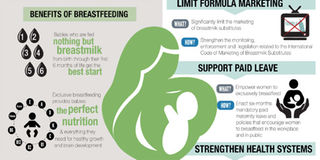Here’s why working-class mothers need ample time to breastfeed

What you need to know:
Supporting nursing mothers to breastfeed anywhere and anytime should be a role played by all community members. But the challenge comes with most of our workplaces not having a supporting environment or policies for nursing mothers.
It is especially critical during the first six months of life for infants to be breastfed, in order to prevent complication
In Tanzania, over 98 per cent of the women breastfeed their infants but only 59 per cent of them can appropriately breastfeed the infants during the first six months of life, data from the Ministry of Health, Community Development, Gender, Elderly and Children show.
As this year’s breastfeeding-week kicked off last Tuesday, Ms Ummy Mwalimu, the Health Minister was at pains to explain the hurdles that women face in trying to ensure Exclusive Breastfeeding (EBF) to their children.
Mothers at work
Ms Mwalimu said that one of the challenges women face nowadays is the failure of working-class mothers to juggle between nursing their babies and meeting work demands.
She also noted, “[It’s challenging] for women to breastfeed their children without supplementing with other foodstuff, during the first six months of life, as per World Health Organisation’s (WHO) guidelines.”
It’s here that she reminded, “All employers should ensure that women who are nursing their children should be given an ample time to breastfeed their infants for six months after maternity leave.”
Tanzania is one of the countries that don’t fully meet the recommended standards for breastfeeding, according to a new report by United Nation’s Children Fund (UNICEF) and WHO in collaboration with the Global Breastfeeding Collective, a new initiative to increase global breastfeeding rates.
The Global Breastfeeding Scorecard, which evaluated 194 nations, found that only 40 per cent of children younger than six months are breastfed exclusively (given nothing but breastmilk) and only 23 countries have exclusive breastfeeding rates above 60 per cent.
The answer to the ‘why’
Evidence shows that breastfeeding has cognitive and health benefits for both infants and their mothers. It is especially critical during the first six months of life for infants to be breastfed, in order to prevent ‘diarrhoea’ and ‘pneumonia’, two major causes of death in infants.
Mothers who breastfeed have a reduced risk of ovarian and breast cancer, two leading causes of death among women, experts say.
“Breastfeeding gives babies the best possible start in life,” said Dr Tedros Adhanom Ghebreyesus, Director-General of WHO. “Breastmilk works like a baby’s first vaccine, protecting infants from potentially deadly diseases and giving them all the nourishment they need to survive and thrive.” The scorecard was released at the start of World Breastfeeding Week alongside a new analysis demonstrating that an annual investment of only $4.70 per newborn is required to increase the global rate of exclusive breastfeeding among children under six months to 50 per cent by 2025.
Nurturing the Health and Wealth of Nations: The Investment Case for Breastfeeding, suggests that meeting this target could save the lives of 520,000 children under the age of five and potentially generate $300 billion in economic gains over 10 years, as a result of reduced illness and health care costs and increased productivity.
“Breastfeeding is one of the most effective—and cost effective—investments nations can make in the health of their youngest members and the future health of their economies and societies,” said UNICEF Executive Director, Anthony Lake.
“By failing to invest in breastfeeding, we are failing mothers and their babies—and paying a double price: in lost lives and in lost opportunity,’’ he said.
The investment case shows that in five of the world’s largest emerging economies—China, India, Indonesia, Mexico and Nigeria—the lack of investment in breastfeeding results in an estimated 236,000 child deaths per year and $119 billion in economic losses.
Breastfeeding is critical for the achievement of many of the Sustainable Development Goals. It improves nutrition (SDG2), prevents child mortality and decreases the risk of non-communicable diseases.
Experts and activists are encouraging people to “Support mums to breastfeed anytime, anywhere,” as all of society has a role to play in making our communities more breastfeeding-friendly, especially the work environment.
Additional reporting from WHO.




